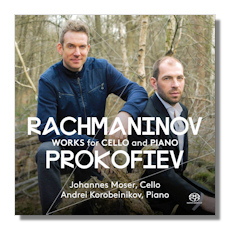
The Internet's Premier Classical Music Source
Related Links
-
Prokofieff Reviews
Rachmaninoff Reviews
Scriabin Reviews - Latest Reviews
- More Reviews
-
By Composer
-
Collections
DVD & Blu-ray
Books
Concert Reviews
Articles/Interviews
Software
Audio
Search Amazon
Recommended Links
Site News
 SACD Review
SACD Review
Russian Works for Cello & Piano

- Serge Prokofieff:
- Sonata for Cello & Piano, Op. 119
- Adagio from Cinderella, Op. 97bis
- Sergei Rachmaninoff:
- Sonata for Cello & Piano, Op. 19
- Vocalise, Op. 34 #14
- Alexander Scriabin: Romance for Cello & Piano (1890)
Johannes Moser, cello
Andrei Korobeinikov, piano
Pentatone SACD PTC5186594 72:07
The Prokofiev and Rachmaninov Sonatas for Cello and Piano are heavily recorded works, both with over fifty listings in the catalog. Yet, in the notes to this album, musicologist Franz Steiger suggests the Rachmaninov is still a new work to many concert-goers. I won't dispute the claim, but whatever currency the piece lacks in the concert hall it more than makes up for on recordings. At any rate, these two works have appeared together on disc before, most notably in performances by Yo-yo Ma and Emanuel Ax on Sony, but more effectively by Julian Steckel and Paul Ravinius on Oehms, which I reviewed here in 2013 (Oehms OC426).
The duo of Johannes Moser and Andrei Korobeinikov offer fine performances of these two works, often interpretively quite different from numerous others I have encountered, and they play convincingly in the fillers as well. German-Canadian cellist Johannes Moser won top prize in the 2002 Tchaikovsky Competition and has made numerous successful recordings. Clearly he demonstrates an affinity for this repertory, as does his partner, the Russian-born pianist Andrei Korobeinikov. In 2004 he won the Moscow-based Scriabin International Piano Competition and went on to capture numerous other top prizes in major competitions. Their collaboration on this new SACD is mostly a success, allowing them to compete with the finest recordings in these works. Their Prokofiev Sonata, which leads off, falls a little short of the Steckel/Ravinius performance, though it may be the equal, in its very different way, of the Ma/Ax. I think everything goes reasonably well throughout the first two movements, but the fast music in the finale is taken at a very brisk clip, sometimes resulting in a breathless hastiness or a muddying of textures. Even the second movement, marked Moderato, is rather reaching to outer limits of that marking. Still, the overall performance must be judged a success, not least because both Moser and Korobeinikov play with great sensitivity, accuracy and intelligence, shaping their interpretation into a compelling vision of the music. They are effective in the plentiful lyrical music, especially in the dramatic and beautiful first movement.
Their Rachmaninov Sonata is even better. Rachmaninov produced this work the same year as his Second Piano Concerto, making it very much in that vein. Because Moser and Korobeinikov appear to be more convincing in lyrical music, their Rachmaninov oozes lush beauty and full-blooded Russian passion. In all four movements they are right on target, even if they tend to be on the lean side in tempo choices. In the end, this must be counted as one of the finest recordings of this work on record, at least in recent times.
As suggested above, the fillers are also very well played. The Prokofiev Waltz from Cinderella, is beautifully phrased and makes a good case for this cello arrangement of this heavenly love music. I must confess that whenever I hear an arrangement of Rachmaninov's Vocalise, I almost always find it convincing, if not totally hypnotic. This account is no exception: the two play the music in a relatively straightforward way and let the music speak for itself – and it does. A lovely performance. The Scriabin Romance, a very early work, lasting less than two minutes, is a nice little bonus that is also well played here.
Pentatone's sound reproduction is excellent and the album notes are very informative. Highly recommended.
Copyright © 2017, Robert Cummings


















